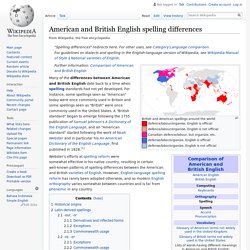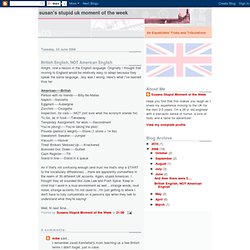

American and British English spelling differences. British and American spellings around the world: defence/labour/organise, English is official defence/labour/organise, English is not official Canadian defence/labour, but organize, etc. defense/labor/organize, English is official defense/labor/organize, English is not official Many of the differences between American and British English date back to a time when spelling standards had not yet developed.

Webster's efforts at spelling reform were somewhat effective in his native country, resulting in certain well-known patterns of spelling differences between the American and British varieties of English. Historical origins[edit] Extract from the Orthography section of the first edition (1828) of Webster's "ADEL", which popularized the "American standard" spellings of -er (6); -or (7); the dropped -e (8); -or (10); -se (11); and the doubling of consonants with a suffix (15). In the early 18th century, English spelling was inconsistent.
Latin-derived spellings[edit] -our, -or[edit] Exceptions[edit] 30 Things British People Say Vs What We Actually Mean. #9 Is Perfect. British English, NOT American English. Alright, now a lesson in the English language.

Originally I thought that moving to England would be relatively easy to adapt because they speak the same language…boy was I wrong. Here’s what I’ve learned thus far: American-----BritishPerson with no friends-----Billy-No-MatesNapkin----ServietteEggplant-----AubergineZucchini-----CourgetteInspection, for cars-----MOT (not sure what the acronym stands for)To Go, as in food-----TakeawayTemporary Assignment, for work-----SecondmentYou’re joking! -----You’re taking the piss! Pounds (person’s weight)-----Stone (1 stone = 14 lbs)Sweatshirt/ Sweater-----JumperVacuum-----HooverTired/ Broken/ Messed Up-----KnackeredBummed Out/ Down-----GuttedCash Register-----TillStand in line-----Stand in a queue. British vs. American English. Glossary of English and British Words. British Life and Culture.
Britishisms and the Britishisation of American English. There is little that irks British defenders of the English language more than Americanisms, which they see creeping insidiously into newspaper columns and everyday conversation.

But bit by bit British English is invading America too. "Spot on - it's just ludicrous! " snaps Geoffrey Nunberg, a linguist at the University of California at Berkeley. "You are just impersonating an Englishman when you say spot on. Will do - I hear that from Americans. And don't get him started on the chattering classes - its overtones of a distinctly British class system make him quiver. But not everyone shares his revulsion at the drip, drip, drip of Britishisms - to use an American term - crossing the Atlantic. "I enjoy seeing them," says Ben Yagoda, professor of English at the University of Delaware, and author of the forthcoming book, How to Not Write Bad. "It's like a birdwatcher.
Last year Yagoda set up a blog dedicated to spotting the use of British terms in American English. 'Ginger,' 'Bits,' 'Whinge,' and other U.K. expressions that have got popular in the U.S.